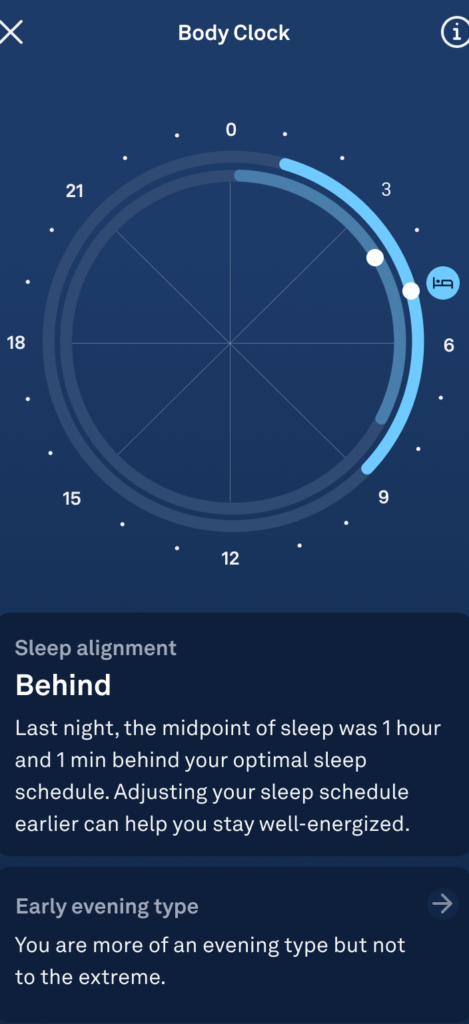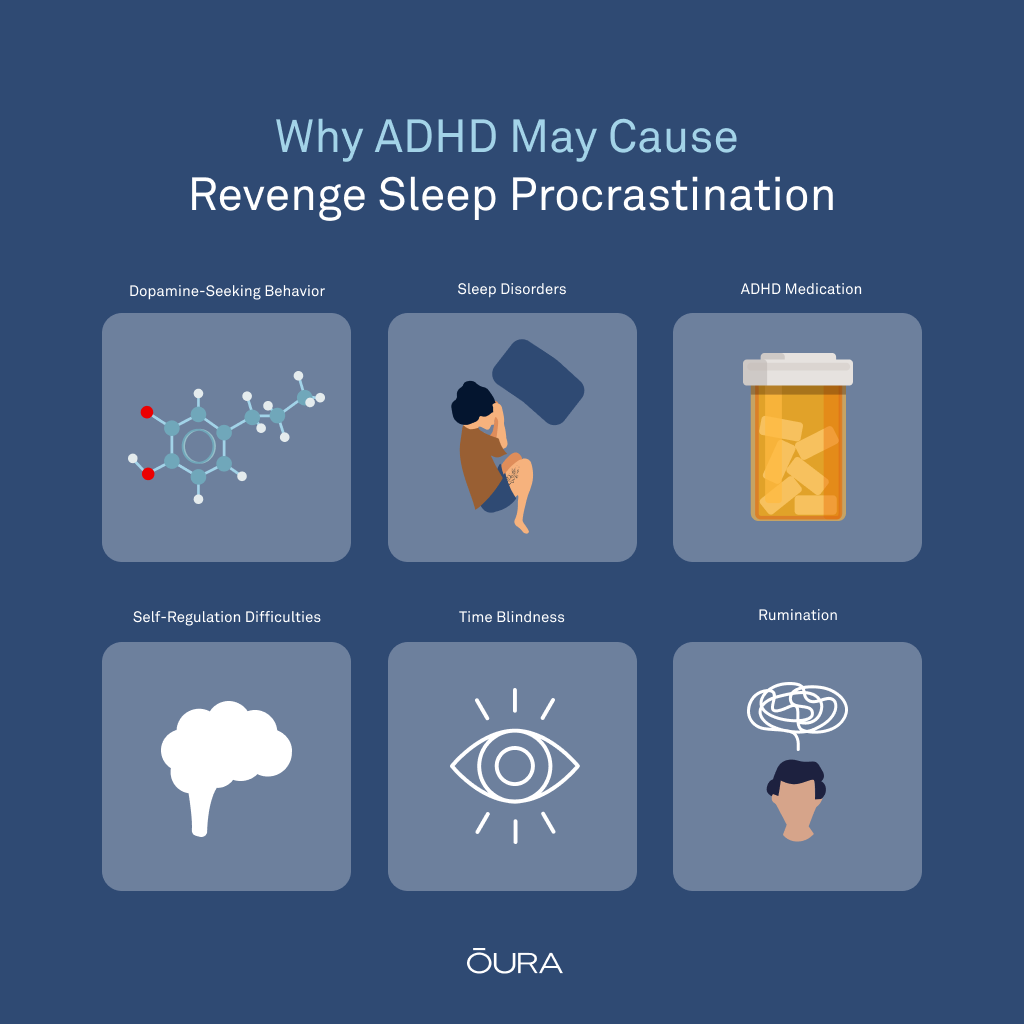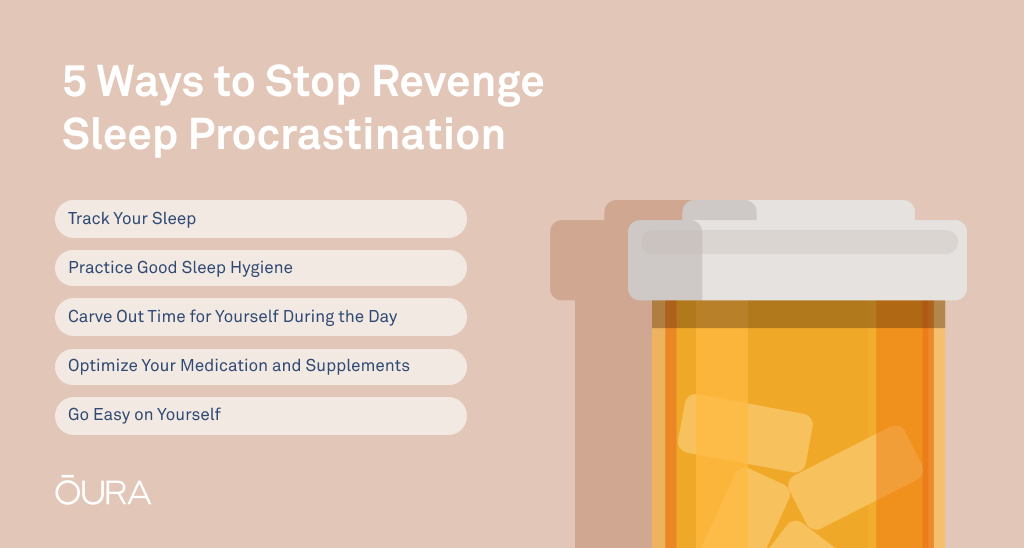Are you a self-described night owl who stays up until the wee hours binge-watching your favorite show or endlessly scrolling through social media, only to wake up the next day exhausted? If so, you’re not alone.
Staying up late even though you’re tired and have to get up early the next day is known as revenge sleep procrastination. The idea is that you’re getting “revenge” on the stressors of the day by doing activities that give you pleasure and help you reclaim some “me” time.
The problem is that these activities can eat into your sleep time and cause a sleep debt to build up. They can also lead to exhaustion and a wide range of health problems.
What is Revenge Sleep Procrastination?
Revenge sleep procrastination is when you deliberately stay up late to reclaim personal time — often seen in people with ADHD (attention deficit hyperactivity disorder) — even though it cuts into sleep and leaves you feeling exhausted the next day.
The term is an English translation of a Chinese expression that refers to delaying your bedtime to regain freedom you may not have during the day due to work or family obligations.
ADHD, one of the most common neurodevelopmental disorders, affects nearly 3% of people worldwide and comes with its challenges. Many people with ADHD report having trouble falling asleep, staying asleep, and waking up in the morning.
| Member Tip: Signs that revenge sleep procrastination is affecting your sleep: late bedtime (showing sleep alignment as behind), lack of deep sleep, and low Sleep Scores. |

What’s the Link Between Revenge Sleep Procrastination and ADHD?
“Sleep and ADHD have a complicated relationship,” says Dr. Chris Winter, a neurologist and sleep researcher at Charlottesville Neurology and Sleep Medicine clinic in Virginia, USA.
“First, many people diagnosed with ADHD are incorrectly diagnosed as such and actually have underlying sleep disorders that create sleep disruptions and their symptoms (which is why the stimulants often help). Stimulant use can also create difficulties initiating sleep as they are acting to facilitate wakefulness.”
If you’re struggling with revenge bedtime procrastination and think it might be linked to ADHD, read on to discover why that may be and what you can do about it.
Why Do People with ADHD Experience Revenge Sleep Procrastination?
The ADHD brain is wired a little differently than a neurotypical brain and can cause revenge sleep procrastination in a number of ways. Let’s explore some of the most common.
Dopamine-Seeking Behavior
Studies suggest that ADHD is linked to lower levels of the neurotransmitter dopamine, which is responsible for feelings of pleasure, satisfaction, and motivation.
Therefore, people with ADHD are naturally prone to seek out activities that produce dopamine — which can lead to staying up late at night seeking a hit, especially if you don’t get enough stimulation during the day or don’t have time for activities that you enjoy.
According to Dr. Winter, “With disorders of attention, individuals often work to create stress, excitement, or danger in their lives to facilitate vigilance and attention. Again, these are also behaviors that individuals with excessive sleepiness utilize to facilitate wakefulness and concentration.”
Sleep Disorders
Research shows that poor sleep is common among people who have ADHD. One reason for this could be that ADHD can disrupt the normal sleep-wake cycle, or circadian rhythm, making it difficult to fall asleep at a regular bedtime.
These disruptions to circadian rhythms can result in a preference for a later bedtime, with many people with ADHD reporting that they feel a sudden burst of energy late at night.
READ MORE: How to Structure Your Ideal Day as an Evening Chronotype
ADHD Medication
Additionally, having trouble sleeping is a known side effect of ADHD medication, although paradoxically, it can also help others get better sleep.
However, incorrect dosage or timing of ADHD medication can keep you up at night.
Self-Regulation Difficulties
One of the most common characteristics of ADHD is having difficulty with self-regulation — this includes impulsivity, hyper-focus, dopamine-seeking behavior, and problems with transitions from one activity to another.
All these factors can lay the groundwork for revenge bedtime procrastination — whether it’s impulsive binge-watching, getting hyper-focused on a random topic and falling down an internet rabbit hole, seeking dopamine hits from social media, games, or dating apps, or simply not finding the motivation to get off the sofa and get ready for bed.
Dr. Winter adds, “To some degree, the act of going to bed is a choice that relies on motivation and discipline. Some people with ADHD struggle with the mere decision to turn off the television or phone and go to bed. This not only compounds the attention issues but creates issues related to sleep deprivation that can cloud the clinical picture.”
Time Blindness
Some people with ADHD have a tendency to lose track of time. This phenomenon is known as time blindness, and it means that some people simply don’t realize it’s time to go to bed — despite their best intentions.
Oura’s Bedtime Guidance tool can help you stay accountable. With this feature, Oura looks for patterns in your data — what time you went to sleep when you received a high Sleep Score, your resting heart rate levels, etc. — that allow Oura to guide you in the right direction. If you start going to bed later while still waking up early, Oura will advise you to begin preparing for bed earlier to make up for lost sleep.
| Member Tip: Turn on notifications to receive a daily alert sent an hour before your personalized, ideal bedtime, helping you start your wind-down routine to maintain a consistent sleep schedule. |
Rumination
If you know you’re going to lie awake at night worrying about the future or ruminating over the past, it can be tempting to stay up late and keep your brain occupied to avoid these thoughts and the feelings that accompany them.

What are the Consequences of Revenge Sleep Procrastination?
A lack of sleep can cause a range of problems for anyone, whether they have ADHD or not, including impaired cognitive function (memory, focus, and concentration), a weakened immune system, mental health conditions, and even heart problems.
Revenge sleep procrastination and the sleep deprivation that comes with it make it harder to think quickly, pay attention, remember things, make decisions, and mitigate stress and anxiety.
Additionally, people with ADHD tend to experience emotional dysregulation, and studies indicate they’re more likely to experience anxiety and substance abuse disorders, which can be aggravated by not getting enough sleep.
READ MORE:
5 Ways to Stop Revenge Sleep Procrastination if You Have ADHD
The good news is that many people with ADHD have successfully overcome their revenge bedtime procrastination habits, and you can, too. Here are five ways to take back control of your sleep.
1. Track Your Sleep
Using a sleep tracker like Oura Ring can help you take the guesswork out of fixing your sleeping habits and getting better sleep. To establish a baseline, it’s a good idea to track the amount of sleep you get per night, including the time spent in each sleep stage (Deep Sleep, Light Sleep, and REM Sleep).
Looking at the clock when you go to bed and when you wake up may not provide an accurate measure of how many hours of sleep you’re getting, so it’s best to use a wearable device, such as an Oura Ring, to track how much time you spend in bed versus how much time you sleep — aka, your sleep efficiency.
Oura members can also use the Tags feature to track their behaviors and habits, and see how they impact their sleep quality over time.
2. Practice Good Sleep Hygiene
Incorporating healthy habits throughout the day and evening that help your body regulate its circadian rhythm and prepare for a good night’s sleep is known as sleep hygiene.
Here are a few ways you could optimize your sleep hygiene:
- Go to bed and wake up around the same time, even on weekends — this is essential for regulating circadian rhythms.
- Avoid screens for at least an hour before bed to minimize blue light exposure. Since people with ADHD tend to wake easily, charge your devices in another room or set up focus mode features to reduce disturbances.
- Avoid eating late at night or consuming coffee or alcohol right before bed.
- Optimize your environment for better quality shuteye. Make sure your room is cool, dark, and quiet, have comfortable bedding, and try to keep work or entertainment activities out of the bedroom.
- Incorporate some relaxing activities into your bedtime routine to help you wind down at the end of the day. This may include journaling, meditation, stretching, or breathing exercises. Oura members can use the Explore content to access guided meditations that help them relax and fall asleep more easily.
- Avoid taking naps during the day, as this can make it harder to fall asleep at night.
READ MORE: How Long Should You Nap?
3. Carve Out Time for Yourself During the Day
A lack of leisure time is often a hidden culprit of revenge sleep procrastination, as it can lead to staying up later than usual to squeeze in activities you enjoy.
If your responsibilities allow it, try to carve out pockets of free time throughout the day and dedicate that time to yourself. This can help create more balance and reduce the likelihood of revenge bedtime procrastination.

4. Optimize Your Medication and Supplements
ADHD medications can improve sleep quality for some and make it worse for others. If you suspect medication may be interfering with your sleep, consult your doctor about changing the dosage or switching to a slow or extended-release option.
“If your experience is less than ideal, discuss the results with your doctor so that necessary adjustments can be made,” Dr. Winter advises.
READ MORE: 9 Science-Backed Herbs and Supplements for Better Sleep
5. Go Easy on Yourself
Self-compassion is the name of the game when it comes to overcoming revenge sleep procrastination. Don’t expect to change your habits overnight, and don’t stress out if you don’t hit your goals right away.
Instead, give yourself time to adjust and celebrate the small wins along the way.
Overcome Revenge Sleep Procrastination ADHD with Oura
Breaking out of the revenge sleep procrastination cycle requires breaking bad habits and committing to new, more beneficial ones.
Oura Ring members can leverage data on movement, temperature, heart rate, and heart rate variability (HRV) throughout the night to understand their sleep patterns and identify anything that might be disturbing them.
This information can provide valuable insights into the effects of revenge sleep procrastination and what habits you can implement to support better sleep. It also allows you to experiment with different nighttime schedules and routines and see what works best for you.
FAQs About Revenge Sleep Procrastination

What is revenge bedtime procrastination ADHD?
Revenge bedtime procrastination happens when you delay sleep to reclaim personal time, even though you’re tired and know you need rest. This late-night habit leads to sleep loss and fatigue.
Why is revenge bedtime procrastination common in ADHD?
Revenge bedtime procrastination and ADHD often go hand in hand because people with ADHD may struggle with self-regulation, dopamine-seeking, and circadian rhythm disruptions — all of which make it harder to go to bed on time.
What are the effects of revenge bedtime procrastination on ADHD?
For people with ADHD, revenge bedtime procrastination can worsen sleep debt, making symptoms like poor focus, time blindness, and emotional dysregulation even more challenging during the day.
How can you stop revenge bedtime procrastination with ADHD?
If you have ADHD, you can reduce revenge bedtime procrastination by sticking to a bedtime routine, practicing good sleep hygiene, carving out leisure time earlier, and using tools like Oura’s Bedtime Guidance to stay accountable.
Can Oura help with revenge bedtime procrastination and ADHD?
Yes — Oura helps track bedtime consistency, sleep stages, and recovery. Features like Bedtime Guidance can support people with ADHD in breaking the cycle of revenge bedtime procrastination and building healthier nighttime habits.











